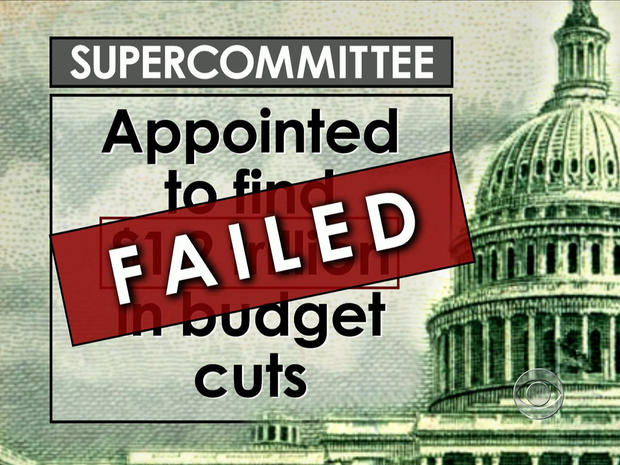Supercommittee failure leaves Congress with much to do
The supercommittee not only failed to cut the deficit by $1.2 trillion, it left Congress with a long to-do list of controversial items that expire at the end of the year. Since any supercommittee package would be protected from amendment and Senate filibusters, Congressional leaders had hoped that the panel could possibly include an extension of unemployment insurance, the payroll tax cut and prevent doctors who treat Medicare patients from seeing a major pay cut.
Instead, Congress has just about three weeks when they return from Thanksgiving to take on these items, without the same protections, along with a patch to protect the middle class from a massive tax hike and the extension of popular business tax breaks. Also, the Congress will have to find a way, again, to prevent a government shutdown when the current spending bill expires on Decembers 16th.
Inaction on any of the items could have an impact on the still-struggling economy.
Below are just some of the major items left on the Congressional to-do list before the end of the year.
Unemployment Insurance:
Unemployed workers are eligible for up to 26 weeks in unemployment benefits, but the programs that provide emergency unemployment benefits for the long-term unemployed are set to expire at the end of this year. The emergency unemployment benefit was created in 2008 under President George W. Bush and extended in 2010 by President Obama. It extends the number of weeks the unemployed can collect benefits based, in part, on the unemployment rate in their home state. For example, if an unemployed individual worked in a state with an unemployment rate of at least 8.5 percent for three months, that individual would get an extra 53 weeks. If the state unemployment rate is over 6 percent, that person would get 47 weeks of extra benefits. The Extended Benefit, which provides up to an additional 20 weeks of compensation also expires at the end of this year. With unemployment still at 9 percent nationally, Democrats argue that now is not the time to allow these programs to expire and say that no Congress has ever allowed these benefits to expire with unemployment over 7.2 percent. Republicans acknowledge unemployment is still a major issue, but point to the $15 trillion debt as a reason that the program's costs should be offset. The maximum number of weeks an unemployed worker is currently eligible for benefits is 99 weeks.
Payroll tax cut:
If Congress fails to extend the payroll tax cut, every worker will see a tax increase in their paychecks come January. This tax break passed the Congress last year as part of the deal to extend the Bush tax cuts. It reduced individual's contributions to Social Security from 6.2 percent to 4.2 percent. The Joint Committee on Taxation estimates the cost of this tax break in 2011 was $111.6 billion. The Tax Policy Center says the average family saved $934 this year with the tax holiday. Proponents of the tax break argue that the extra money in people's pockets provided needed stimulus spending and that taking that away would hurt the struggling economy, but opponents on both sides of the aisle are concerned that this tax cut is a drain on Social Security and Republicans would like to see the costs offset elsewhere if the tax holiday is extended at all. President Obama proposed extending and expanding this tax credit to employers as part of his American Jobs Act, but that looks unlikely to pass this year.
Medicare "Doc Fix":
It's deja vu all over again for this annual threat to doctors who treat Medicare patients. If Congress goes home for the holidays without extending what's known as the Medicare "Doc Fix" then physicians who treat Medicare patients will see a 30 percent pay cut from the federal government next year. This patch would increase the deficit by $22 billion and lawmakers regularly fight over how to pay for this extension. The fear in letting the reimbursement rate go down is that doctors would just stop taking Medicare patients.
Alternative Minimum Tax (AMT):
Another annual battle that Congressional leaders had hoped the supercommittee could resolve concerns the Alternative Minimum Tax (AMT). The AMT was designed to make sure the wealthy paid taxes and did not get out of paying their share by claiming too many deductions. But Congress did not tie the minimum tax to inflation and it now threatens to hit more of the middle class each year. The cost of protecting middle class Americans from a massive tax hike this past year was $136.6 billion according to the Joint Committee on Taxation. Both parties want to patch the AMT, but the issue is, once again, over how to pay for it.
Business Tax Breaks:
Also set to expire at the end of this year are a number of popular business tax breaks and investment incentives. Those include a research and development tax credit, the ability for businesses to write off bonus depreciation on new assets like equipment and numerous tax breaks to promote energy efficiency. The research and development tax credits are often packaged with the AMT patch.
Funding the Government:
The latest spending bill passed by Congress keeps the federal government operating through December 16th, but the fiscal year doesn't end until September 30, 2012. That means the House and Senate must find a way to keep the government operating at least through the holidays to avoid a partial government shutdown. Appropriators and Congressional leadership aides hope to be able to wrap up spending fights for the year before Christmas, but controversial issues over abortion and health care funding will make that very difficult to accomplish in just three weeks, if it's even possible this year given the major divide between House Republicans and Senate Democrats.

